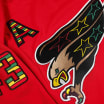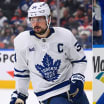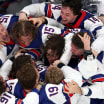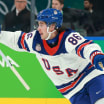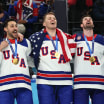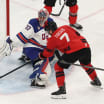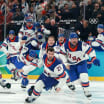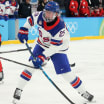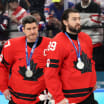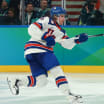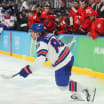Mailbag: Blackhawks rebuilding, chances of Lafreniere in World Juniors
NHL.com's Tim Campbell answers weekly questions
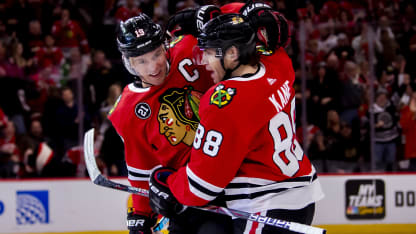
© Icon Sportswire/Getty Images
With the Blackhawks officially going for a rebuild, do you think there's a chance Toews and/or Kane are moved to get more assets? If so, does Chicago retain salary to help stay above the cap floor while prospects develop? Do they trade and take on contracts to get assets? -- @mikeybox
A point of clarity is needed. I don't think the Chicago Blackhawks started their rebuild Tuesday, when they
posted on social media a letter
to fans acknowledging as much. It's been underway for some time now. That said, the public declaration is intended to provide some clarity and context for fans, and while it's doing that, I believe it's giving the players you mentioned, forwards Jonathan Toews and Patrick Kane, and probably including defensemen Duncan Keith and Brent Seabrook too, the same sort of thing. Those four met with management this week and discussed the path forward, which was an important step. Could those veterans be moved? I think everything is on the table now for Blackhawks management, but at last check, those veterans each has a version of a no-move or no-trade clause in his contract, so going elsewhere will be up to him. I'd also guess that the Blackhawks won't want to subtract character leaders who can show the way for the new generation of players they will be counting on. The value of experience and wisdom gained by winning the Stanley Cup three times (2010, 2013, 2015) cannot be replaced. As for retaining salary in trades and trading for contracts that would help them stay above the floor in the NHL salary cap system ($60.2 million), it's a tool that may come into play here or there as the rebuild unfolds, but in my opinion, that's unlikely to be a central philosophy for a rebuild in an Original Six market.
NHL Tonight discusses the Blackhawks' rebuild
Alexis Lafreniere plays in the World Juniors? -- @DaveyUpper
It's still early and though I wouldn't rule it out, Lafreniere's chances of playing for Canada in the 2021 IIHF World Junior Championship in Edmonton Dec. 25-Jan. 5 aren't as good as most Canadians would like them to be. The NHL is targeting Jan. 1 for its first games this season, and in that scenario, training camps would be open by mid-December. Lafreniere, the No. 1 pick of the 2020 NHL Draft, will need camp to get acclimated to his new team, the New York Rangers, who expect him to be a top-nine forward this season.
If training camps and the start of the NHL season are pushed back and do not conflict with World Juniors, it's unclear how the Rangers would react. Many teams won't send an eligible player who is already a regular on an NHL roster to the tournament. Given how highly regarded Lafreniere is by the Rangers, it's unlikely they will find sending him to Edmonton for almost two weeks all that appealing. There's a strong chance Lafreniere has already played his last game as a junior.
Do you think Martin Jones is a buyout candidate if him and Dubnyk don't perform this season with Alexei Melnichuk waiting in the wings since he will be in the AHL this season? -- @GLaSnoST9
After this season, Jones will have three seasons left on the six-year extension he signed July 1, 2017, so any buyout would be a salary cap charge for the San Jose Sharks for the next six years. That's a harsh, long-term pill to swallow, and you should always keep that in mind when these issues come up. That said, buying out the contract has to be considered a worst-case scenario for the Sharks. I believe Jones will have every chance to stake his claim to the job as the Sharks' No. 1 goalie, which he has held since 2015-16, but there is no doubt that he is coming off two down seasons that run counter to earlier career trajectory. He is 53-40-7 with a 2.96 goals-against average and .896 save percentage since 2018-19 after going 65-45-12 with a 2.47 GAA and .913 save percentage the previous two seasons (2016-18). It's worth noting that Jones made up for an inconsistent regular season in 2018-19 by helping the Sharks defeat the Vegas Golden Knights and Colorado Avalanche in the first two rounds of the Stanley Cup Playoffs and reach the Western Conference Final before losing in six games to the St. Louis Blues, who went on to win the Stanley Cup.
The Sharks will have much to ponder about Jones, especially after finishing last in the Western Conference last season (29-36-5, .450 points percentage). Were the poor results because of Jones' play or the team in front of him? How will he mesh with veteran Devan Dubnyk sharing the net this season? Dubnyk, with one season remaining on his contract, was acquired with a seventh-round pick in the 2022 NHL Draft in a trade from the Minnesota Wild on Oct. 5 for a fifth-round pick in 2022. If Jones and/or Dubnyk don't solidify the goaltending this season, San Jose could have some tough choices to make. As much as the Sharks may be optimistic about Melnichuk, he will be a 23-year-old undrafted prospect with one North American season under his belt, that in the American Hockey League, entering 2021-22, and it's hard to see general manager Doug Wilson basing a decision on that alone.
In light of the NHL using a 1-8 seeded playoffs for the first time in seven years in the Return to Play bubbles, will the NHL go back to that format after the Seattle Kraken start playing? -- @nashman92
My guess on that would be no. The NHL used a different seeding format in its Return to Play this season because of the extraordinary circumstances that saw the regular season cut short due to concerns surrounding the coronavirus. The postseason format was designed to include teams that had a reasonable chance to qualify for the playoffs, thus the best-of-5 Stanley Cup Qualifiers between the bottom-eight qualifiers from each conference. The chances of ever seeing that again are low, in my opinion. A playoff format with conference-based seeding all the way through was used in the NHL from 1993-94 to 2012-13, but since then, more focus has been put on divisional play and divisional rivalries.
That's been accomplished by keeping teams within their divisions as much as possible with the wild card format. Conference-based seeding (i.e. No. 1 vs. No. 8, No. 2 vs. No. 7, etc.), as you propose, has been a talking point since the current format was adopted for the 2013-14 season, but I have not sensed any great groundswell among players or teams that returning to it is a priority, and I don't think Seattle's debut in the NHL for the 2021-22 season will change opinions much.
